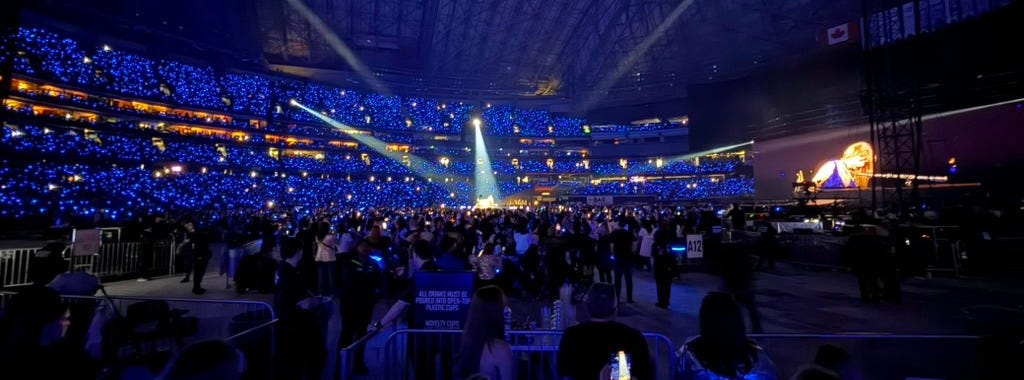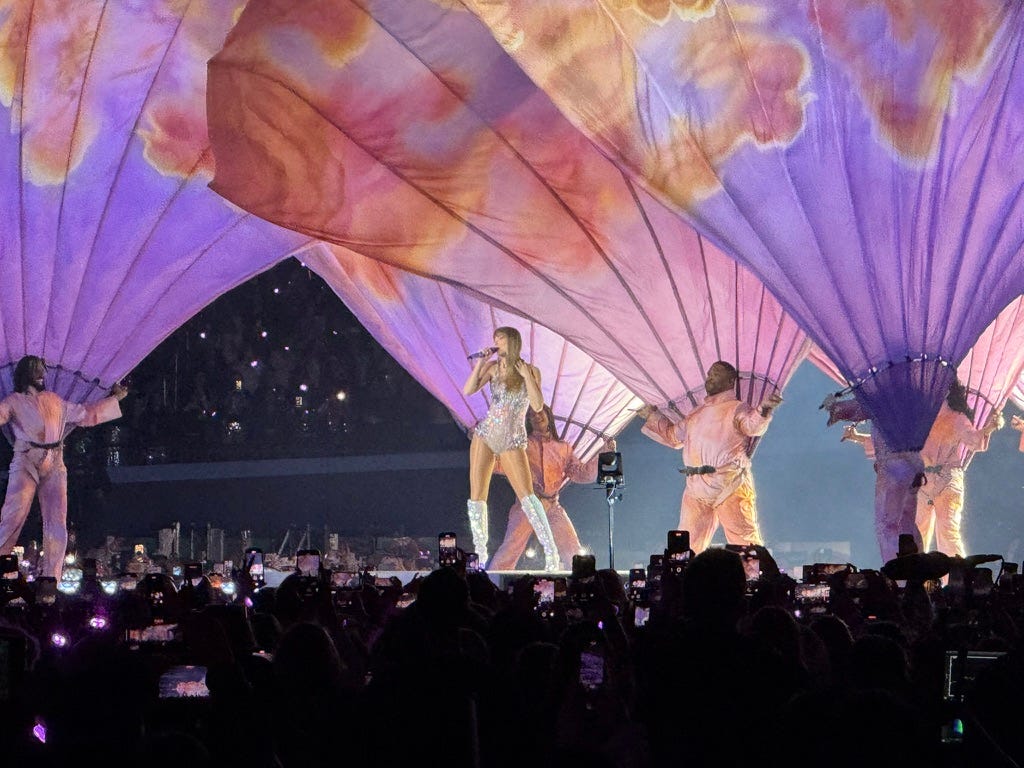As 50-something men don’t tend to do (unless you are the Prime Minister of Canada), I found myself at Taylor Swift’s final Toronto show with 55,000 other people, including my die-hard Swiftie, 20-year-old kid. Lest you think I was dragged out unwillingly, I knew and loved all of the songs, at least from pre-Pandemic eras, so I was quite thrilled to be there. But those of you who aren’t economists should know that Taylor is a hero to economists ever since she decided to screw over her former manager who wouldn’t sell her the rights to her older songs and re-record the whole lot, thereby, providing the quintessential teaching example regarding how crucial it is to understand the game you are playing. Scooter Braun was playing checkers, while Taylor Swift played 11-dimensional chess.
The concert was three and a half hours with no break. That provided me the opportunity — as I am want to do (especially during the folklore-evermore era) — to consider some important questions potentially of interest to readers of this substack: how is AI going to change this whole experience?
Ultimately, my conclusion was: not much. Indeed, there was a strong sense in which events such as this represent the most likely places where AI is unlikely to be transformational.
To understand this, we need to back up a little. This was the first concert I had attended since the 1990s; well, if you set aside classic concerts that I dragged my kids to for “educational” reasons despite none of us wanting to be there and The Wiggles, which we all wanted to go to. Back in those days, concerts were very different. There was no big video screen when I saw Stevie Nicks and Dire Straits at a time when I clearly had better eyesight. Even Elon John didn’t bother with elaborate costumes any more. The best thing we might get was some fancy lighting. But I remember pretty much all of them in much the same way as I forgot I ever saw Independence Day 2 in a theatre.
By contrast, the Eras Tour is at the forefront of what is possible technologically. For all I know, much of this is pretty standard, although that would be surprising. There was a massive screen with excellent production effects (i.e., “where the heck is the camera getting that angle?”), everyone had light-up wristbands that not only flashed colours in sync with the music but also made out shapes in the crowd (see picture).
And then there was the stage, itself a giant video screen with multiple raised partitions (also video screens) that meant the whole show took place on three axes. This also meant that the performers had to be in the right place at the right time.
None of this does justice to whatever must have been going on behind the scenes with costume changes and the like.
Suffice it to say, compared to the concerts of my past, This whole deal required a massive amount of capital and complementary labour to stage. The result was something completely flawless in execution (as nearly as I could tell), and that would not have been possible without the IT revolution.
So, what about AI? Where might that come into the picture? Anything I could imagine was incremental. AI could be used to provide more elaborate and complex staging, but even that has to be of the kind that can work with people. One imagines that AI would be more useful in choreography than in doing anything during the day. Similarly, for the lighting effects in the audience. AI could potentially make that better. AI could also be used to predict trouble in the mechanics and staging during the show. But my guess is that would be substituting for a considerable amount of redundancy and planning. If that were the case, it is not certain that AI will ever be reliable enough to make that worthwhile. The point here is that these events are so planned down to the nanosecond that there is little scope for AI to insert itself into it during a performance without disrupting that reliability. As we emphasised in Power and Prediction, this is a major challenge for transformational AI adoption everywhere.
Now you are probably thinking: what about VR or AR? VR might change who can attend concerts, and there can be a debate about whether it would be a substitute for them. But I suspect the concert will still actually be taking place in front of a crowd that places a premium on being there. With respect to AR, that might allow people to have a personalised experience (for instance, being able to see the video without having to stand up, which, frankly, I could have used). However, it seems to me that the point of going to an event like this is precisely not to get a personalised experience but a collective one.
Then, we need to turn to the elephant in the room. The entire event rested on Taylor Swift and her performance. That was the highlight. I can tell you that three and a half hours non-stop is a long time. It was long for me, and all I was doing was trying to calculate whether or not I could sit the next song out. But for Swift, what she did was unprecedented. This wasn’t just a rock performance where there is a ton of liberty as to what you were doing. This was a precise performance where there was little room to just do something different. I’ll skip whether that is a good thing or not (sometimes you like to go to events in the hope of seeing some chaos — ahem, Oasis), but what I saw could only be described as “proof of massive friggin’ work.” That is what we will surely be talking about for decades to come. And to do it for over a year is just crazy.
Given the high cost of this to the performer herself, could AI come here and help out? Yes, it could. This could be simulated. We could have some projection that is lifelike doing the same thing. But my guess is that if that were to happen, then it would be for some other purpose (akin to a souped-up concert movie or something or whatever it is ABBA are doing these days).
My belief from seeing this is that there will be no substitute for human performance. There will also be demand, and considerable demand, for it. Not only are there fans who simply value being in the presence of a human artist. But there are many others who simply are there to appreciate human effort. Can all of this be technically simulated? Yes. But a simulation isn’t what people are coming there for. There is a need to see human effort being humanly or super-humanly applied.
We won’t be recounting to our grandchildren a wistful story of how we could see people perform complex concerts and musicals and the like in the old days, but that is all gone with AI. My strong conjecture after seeing this is that it will endure. And I’ll be happy to see another one — but from a seat in the front row of a section so I don’t have to stand up the whole time and a little personalised bathroom nearby because three and a half hours is a long time without a pause button.






